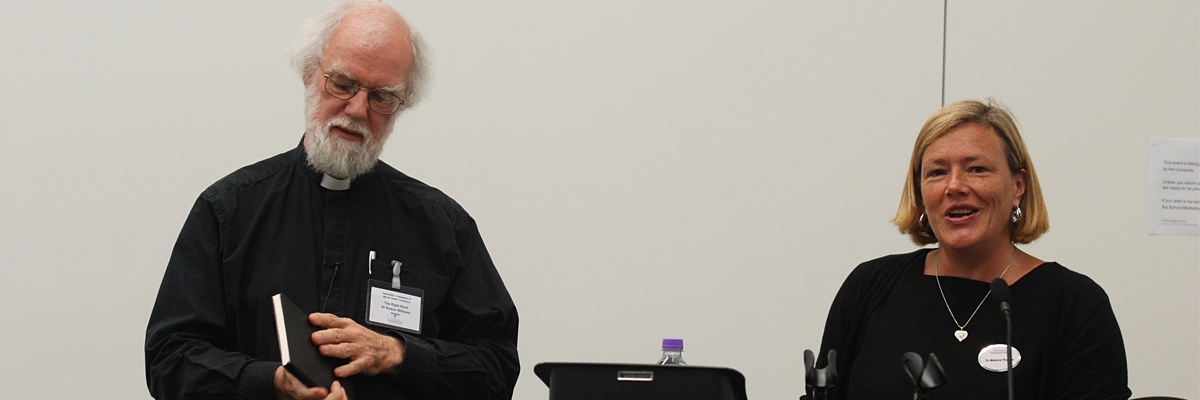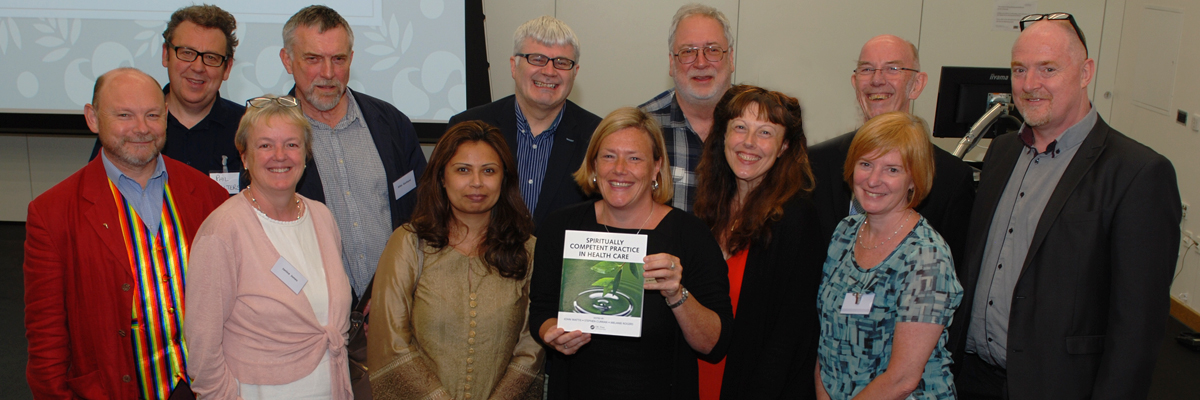Dr Rowan Williams was a keynote speaker with a talk entitled Nourishing the spirit: relations, stories, rhythms
FORMER Archbishop of Canterbury The Rt Revd Dr Rowan Williams was one of the speakers at a University of Huddersfield conference that celebrated the role of spirituality and compassion in mental health care.
The 220 delegates came from all across the North and other parts of the UK, and there were several from overseas. They were from health and social care settings, the voluntary sector, faith communities and included carers, services users, academics, researchers and students.
story continues below...
 Conference organiser Dr Melanie Rogers with keynote speaker Dr Rowan Williams
Conference organiser Dr Melanie Rogers with keynote speaker Dr Rowan WilliamsIn addition to lectures and discussion sessions, the conference was also the setting for the launch of newly-published book Spiritually Competent Practice in Health Care by the University of Huddersfield’s Professor John Wattis, Professor Stephen Curran, and Dr Melanie Rogers.
The University is home to the Spirituality Special Interest Group (SSIG), which researches issues such as how spirituality and compassion can aid health and social care, and this was its second conference, organised in tandem with the South West Yorkshire Partnership NHS Foundation Trust.
Delegates were welcomed by University Vice-Chancellor Professor Bob Cryan, who praised the work of the SSIG, which, he said, “leads to higher levels of hope, meaning and purpose among patients, improving the quality of their lives and the lives of their loved ones”.
Dr Williams was introduced by Senior Lecturer and Advanced Nurse Practitioner Dr Rogers, Chair of the SSIG, who said how delighted she was when the former Archbishop, now a member of the House of Lords and Master of Magdalene College Cambridge, accepted her invitation to speak at the conference.
His talk was titled Nourishing the spirit: relations, stories, rhythms. Dr Williams drew on sources including poetry, literature, academic research and philosophy as he discussed issues such as the importance of memory – in the body as well as the mind – the need for people to have a strong sense of habitat, and to have a “dependable other” for support.
He spoke about religious traditions but stated that “to be spiritual is not to be detached from the physical environment”.
“The spiritual life is at least as much to do with knowing how to cultivate a garden or make loaf of bread as it is to do with church or chapel.”
story continues below...
 Book editors and contributors
Book editors and contributorsThe opening session at the Spirituality Conference was from Wilf McSherry, who is Professor in Nursing at Staffordshire University and an executive member of the British Association for The Study of Spirituality. His talk was titled What is spirituality and what does spiritually competent practice look like in health and social care?.
After this came a talk asking What does compassion and love look like in crisis care? from Fiona Venner, Chief Executive of Leeds Survivor Led Crisis Service, who has worked in mental health since the early 1990s.
The first afternoon session was from Kevin Bond, who has a background in nursing and is a former Chief Executive of NAVIGO, an innovative NHS Mental Health provider organisation. He spoke on Revolutionising mental health provision through compassion.
John Wattis, Visiting Professor of Old Age Psychiatry at the University of Huddersfield and a committee members of the SSIG, gave a presentation on Spirituality competent practice in health and social care; followed by Dr Rogers, who spoke about availability and vulnerability as a way of operationalising spirituality.
The final session was on Creativity and spirituality from Phil Walters, Creative Minds Strategic Lead for the South West Yorkshire NHS Partnership, and Debs Taylor, who is peer project development and admin support worker for the art therapy organisation. Creative Minds who spoke about her experiences as a service user.
Dr Rogers was delighted by the success of the conference, saying that its themes resonated with all delegates.
The evaluations were overwhelming positive and the desire to see spiritually competent care and an increase in compassionate practice was clear. Questions raised included how practitioners do this in a short period of time and what happens when organisational culture does not support this approach to care
Dr Rogers
Future plans are to hold a spirituality research symposium in 2018, and a further conference in 2019.
- New book Spiritually Competent Practice in Health Care (CRC Press) by John Wattis, Stephen Curran, and Melanie Rogers is practical guide that tackles the important issues of spirituality in health care, emphasising the role of organisations in developing a culture of leadership and management that facilitates spiritual care. Spirituality is described as “a central part of holistic care that addresses physical, mental, emotional and spiritual aspects of care in an integrated way”.
